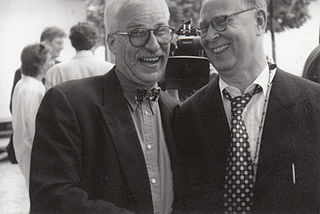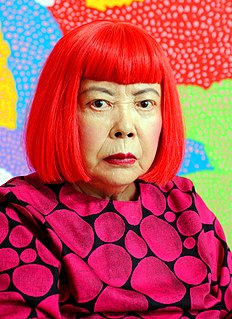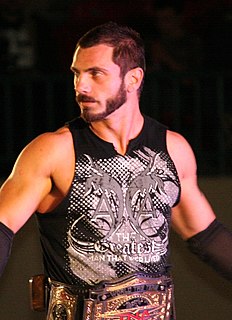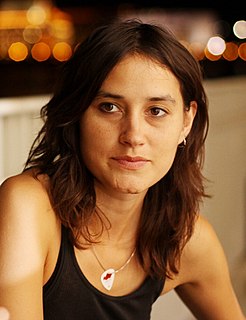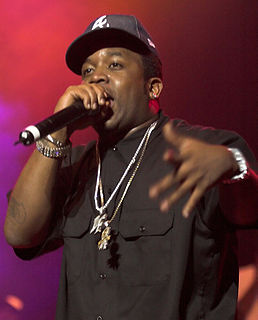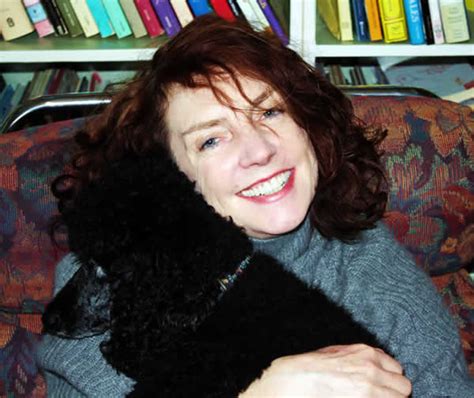A Quote by Stephen Nachmanovitch
Many musicians are fabulously skilled at playing the black dots on the printed page, but mystified by how the dots got there in the first place and apprehensive of playing without dots. Music theory does not help here; it teaches rules of the grammar, but not what to say. When people ask me how to improvise, only a little of what I can say is about music. The real story is about spontaneous expression, and it is therefore a spiritual and a psychological story rather than a story about the technique of one art form or another.
Quote Topics
About
Another
Apprehensive
Art
Art Form
Ask
Ask Me
Black
Does
Dots
Expression
First
First Place
Form
Got
Grammar
Help
How
Improvise
Little
Many
Me
Music
Music Theory
Musicians
Only
Page
People
Place
Playing
Printed
Psychological
Rather
Real
Real Story
Rules
Say
Skilled
Spiritual
Spontaneous
Story
Teaches
Technique
Than
Theory
Therefore
Without
Related Quotes
Normal people, who grow up with compassion, never amount to anything. They're the ones who end up gluing those little dots on the highway. Or, putting glue on the dots for the guy who glues dots on the highway. Screwed up people, who weren't coddled or raised with compassion, we get stuff done. Sure, we feel a little alone and abandoned, but, we're... very... happy. Why can't you love me, daddy?
A polka-dot has the form of the sun, which is a symbol of the energy of the whole world and our living life, and also the form of the moon, which is calm. Round, soft, colourful, senseless and unknowing. Polka-dots can't stay alone; like the communicative life of people, two or three polka-dots become movement... Polka-dots are a way to infinity.
Thinking about making a love story without music was really frightening, Sciamma admitted. Because every love story we know, we think about 'Titanic' we think about the music, we think about 'Gone with the Wind' we think about the music, we think about 'E.T.' we think about the music, and every love story has its own tune, 'That's our song.'
I think that once I started connecting dots of where my food was coming from and the reality of that, as opposed to maybe what you think it is as a little kid, and the realities of how my food was getting to my plate and what the real effects of that are. When I started connecting those dots, I couldn't disconnect them.
I think the best thing about music is that someone could be writing a song that's so personal, and it tells so many other people's story at the same time. It kind of exemplifies that we are all kind of on the same wave[length] - it's amazing how comforting somebody else's story can be, because we have experienced their story in some way or another, and I can totally relate, and I get to feel that feeling and the expression of that emotion. I get to feel like as a listener, that somebody understands me, which is pretty incredible.
I routinely interview college students, mostly from top schools, and I notice that their brains are like old maps, with lots of blank spaces for the uncharted terrain. It's not that they lack for motivation or IQ. It's that they can't connect the dots when they don't know where the dots are in the first place.
What's your story? It's all in the telling. Stories are compasses and architecture; we navigate by them, and to be without a story is to be lost in the vastness of world that spreads in all directions like arctic tundra or sea ice. To love someone is to put yourself in their place, we say, which is to put yourself in their story, or figure out how to tell yourself their story. Which means that a place is a story, and stories are geography, and empathy is first of all an act of imagination, a storyteller's art, and then a way of traveling from here to there.
The elements of a good story are most definitely details, little bitty details. That does it, especially when you're describing, when you're setting the scene and everything. It's like you're painting a picture, so details are very important. Also, the music gotta be right. The music can really set the tone for the story and let you know what the story is gonna be about, but definitely, it's the vibe in the place where you at and the detail.
When we were small, Rose and I used to play a game called connect the dots. I loved it. I loved drawing a line from dot number 1 to dot number 2 and so on. Most of all, I loved the moment when the chaotic sprinkle of dots resolved itself into a picture. That's what stories do. They connect the random dots of life into a picture. But it's all an illusion. Just try to connect the dots of life. You'll end up with a lunatic scribble.
The thing about games is, players often say they don't care about story, but then if you took the story out, what would their reaction be? If no one cared about story, we'd all still be playing Pac-Man. There's nothing wrong with Pac-Man, but the point is, there's a genre of games in which you want to become part of that world.



